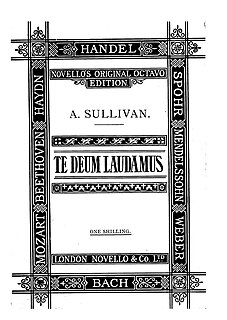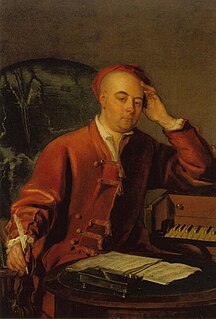
The epiclesis refers the invocation of one or several gods. In ancient Greek religion, the epiclesis was the epithet used as the surname given to a deity in religious contexts. The term was borrowed into the Christian tradition, where it designates the part of the Anaphora by which the priest invokes the Holy Spirit upon the Eucharistic bread and wine in some Christian churches. In most Eastern Christian traditions, the Epiclesis comes after the Anamnesis ; in the Western Rite it usually precedes.

"Gloria in excelsis Deo" is a Christian hymn known also as the Greater Doxology and the Angelic Hymn/Hymn of the Angels. The name is often abbreviated to Gloria in Excelsis or simply Gloria.

Easter Saturday, on the Christian calendar, is the Saturday following the festival of Easter, the Saturday of Easter or Bright Week. In the liturgy of Western Christianity it is the last day of Easter Week, sometimes referred to as the Saturday of Easter Week or Saturday in Easter Week. In the liturgy of Eastern Christianity it is the last day of Bright Week, and called Bright Saturday, The Bright and Holy Septave Saturday of Easter Eve, or The Bright and Holy Septave Paschal Artos and Octoechoes Saturday of Iscariot's Byzantine Easter Eve. Easter Saturday is the day preceding the Octave Day of Easter.

Hodie is a cantata by Ralph Vaughan Williams. Composed between 1953 and 1954, it is the composer's last major choral-orchestral composition, and was premiered under his baton at Worcester Cathedral, as part of the Three Choirs Festival, on 8 September 1954. The piece is dedicated to Herbert Howells. The cantata, in 16 movements, is scored for chorus, boys' choir, organ and orchestra, and features tenor, baritone, and soprano soloists.
Thanksgiving after Communion is a spiritual practice among Christians who believe in the Real Presence of Jesus Christ in the Communion bread, maintaining themselves in prayer for some time to thank God and especially listening in their hearts for guidance from their Divine guest. This practice was and is highly recommended by saints, theologians, and Doctors of the Church.
Psalm 90 is a musical composition by the American composer and insurance executive Charles Ives, written in 1923–24.

Arthur Sullivan's Te Deum Laudamus—A Thanksgiving for Victory, usually known as the Boer War Te Deum, is a choral work composed by Sullivan in the last few months of his life. It was commissioned on behalf of Dean and Chapter of London's St. Paul's Cathedral by the cathedral's organist, Sir George Martin, as part of a grand service to celebrate the expected British victory in the Boer War.

The Light of the World is an oratorio composed in 1873 by Arthur Sullivan. Sullivan wrote the libretto with the assistance of George Grove, based on the New Testament. The work was inspired by William Holman Hunt's popular 1853–54 painting, The Light of the World. The story of the oratorio follows the whole life of Christ, told mostly in the first person, focusing on his deeds on Earth as preacher, healer and prophet.
Coronation Ode, Op. 44 is a work composed by Edward Elgar for soprano, alto, tenor and bass soloists, chorus and orchestra, with words by A. C. Benson.

The Te Deum for the Victory at the Battle of Dettingen in D major, HWV 283, is the fifth and last setting by George Frideric Handel of the 4th-century Ambrosian hymn, Te Deum, or We Praise Thee, O God. He wrote it in 1743, only a month after the battle itself, during which Britain and its allies Hannover and Austria soundly routed the French.

"Te Splendor" is a Roman Catholic hymn dedicated to Saint Michael, the Archangel. The hymn derives its name from the fact that in Latin it begins with the words: Te splendor et virtus Patris. The hymn is included in the Raccolta collection of prayers with indulgences, and its authorized translations.
The Compline Choir is a nationally acclaimed choral group that chants the Office of Compline every Sunday night, 9:30 P.M. Pacific time, at St. Mark's, Seattle in Seattle, Washington, US. The Office of Compline is made up of sacred music including plainsong and polyphonic compositions, and chanted recitations of the Apostles' Creed and the Lord’s Prayer.

Utrecht Te Deum and Jubilate is the common name for a sacred choral composition in two parts, written by George Frideric Handel to celebrate the Treaty of Utrecht, which established the Peace of Utrecht in 1713, ending the War of the Spanish Succession. He composed a Te Deum, HWV 278, and a Jubilate Deo, HWV 279. The combination of the two texts in English follows earlier models. The official premiere of the work was on 13 July 1713 in a service in St Paul's Cathedral in London.

Messiah, the English-language oratorio composed by George Frideric Handel in 1741, is structured in three parts. This listing covers Part II in a table and comments on individual movements, reflecting the relation of the musical setting to the text. Part I begins with the prophecy of the Messiah and his birth, shows the annunciation to the shepherds and reflects the Messiah's deeds on earth. Part II covers the Passion in nine movements including the oratorio's longest movement, an air for alto He was despised, then mentions death, resurrection, ascension, and reflects the spreading of the Gospel and its rejection. The part is concluded by a scene called "God's Triumph" that culminates in the Hallelujah Chorus. Part III of the oratorio concentrates on Paul's teaching of the resurrection of the dead and Christ's glorification in heaven.

Sing Unto God/Anthem for the Wedding of Frederick, Prince of Wales and Princess Augusta of Saxe-Gotha,(HWV 263), is an anthem composed by George Frideric Handel. It was performed for the royal wedding on 27 April 1736 at the Chapel Royal in St James's Palace, London with Francesca Cuzzoni-Sandoni, Carlo Broschi "Farinelli", and Francesco Bernardi "Senesino". The text was adapted from verses of Psalms 68, 106 and 128

The Te Deum in D major, "Queen Caroline" is a canticle Te Deum in D major composed by George Frideric Handel in 1714.

Chandos Jubilate, HWV246, is a common name for a choral composition by George Frideric Handel. It was published as the first of the Chandos Anthems, and is known also as Chandos Anthem No. 1 and as Jubilate in D Major. A setting of Psalm 100, "O, be joyful in the Lord", it is the first in a series of church anthems that Handel composed between 1717 and 1718, when he was composer in residence to James Brydges, later 1st Duke of Chandos. The anthem was probably first performed at St. Lawrence's church, Whitchurch, near Brydges' country house. The work is written for a small ensemble of instrumentalists, solo singers and choir, and is approximately twenty minutes in length.

The Te Deum in C is a sacred choral composition by Benjamin Britten, a setting of the Te Deum on the English text from the Book of Common Prayer. Britten wrote it in 1934 between 11 July and 17 September, scored for treble solo, four-part choir (SATB) and organ.
















